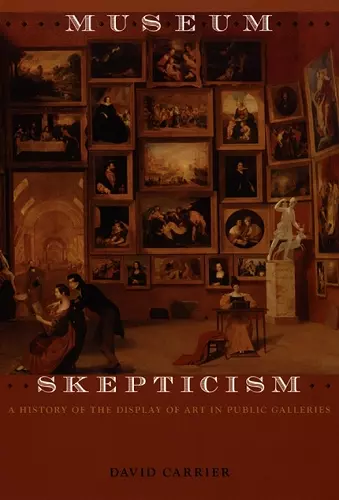Museum Skepticism
A History of the Display of Art in Public Galleries
Format:Paperback
Publisher:Duke University Press
Published:31st May '06
Currently unavailable, and unfortunately no date known when it will be back

In Museum Skepticism, art historian David Carrier traces the birth, evolution, and decline of the public art museum as an institution meant to spark democratic debate and discussion. Carrier contends that since the inception of the public art museum during the French Revolution, its development has depended on growth: on the expansion of collections, particularly to include works representing non-European cultures, and on the proliferation of art museums around the globe. Arguing that this expansionist project has peaked, he asserts that art museums must now find new ways of making high art relevant to contemporary lives. Ideas and inspiration may be found, he suggests, in mass entertainment such as popular music and movies.
Carrier illuminates the public role of art museums by describing the ways they influence how art is seen: through their architecture, their collections, the narratives they offer museum visitors. He insists that an understanding of the art museum must take into account the roles of collectors, curators, and museum architects. Toward that end, he offers a series of case studies, showing how particular museums and their collections evolved. Among those who figure prominently are Baron Dominique Vivant Denon, the first director of the Louvre; Bernard Berenson, whose connoisseurship helped Isabella Stewart Gardner found her museum in Boston; Ernest Fenollosa, who assembled much of the Asian art collection now in the Museum of Fine Arts, Boston; Albert Barnes, the distinguished collector of modernist painting; and Richard Meier, architect of the J. Paul Getty Center in Los Angeles. Carrier’s learned consideration of what the art museum is and has been provides the basis for understanding the radical transformation of its public role now under way.
“Museum Skepticism is a fascinating study, original, brilliant, and erudite. I absolutely loved reading this book.”—Ellen Handler Spitz, author of The Brightening Glance: Imagination and Childhood
“David Carrier is one of only a handful of scholars who inhabit with ease the diverse worlds of philosophy, art history, art criticism, and now museology. His philosophical acuity probes the responsibilities, shortcomings, and achievements of art museums, and the responses of their academic critics. Carrier’s provocative reflections on the successive metamorphoses of these irreplaceable yet infuriating institutions are sure to be a stimulus to the democratic conversation about their future that he so warmly advocates. Reading Carrier is like reading Montaigne: no one could be a more thoughtful, witty, or erudite imaginary interlocutor for the fortunate reader of this impassionedly personal yet highly disciplined book.”—Ivan Gaskell, Harvard University
“Museum Skepticism certainly delivers, what it promises-a valid and convincing theory that answers the question: "What is it to lead the life of a work of art?" It offers a glimpse into the lives of several iconic public art museums and the personalities that contributed to the development of these institutions and their collections. . . . With its passionate tone and accessible language, it should be part of any art student’s library.” -- Alise Piebalga * Leonardo Reviews *
ISBN: 9780822336945
Dimensions: unknown
Weight: 463g
328 pages